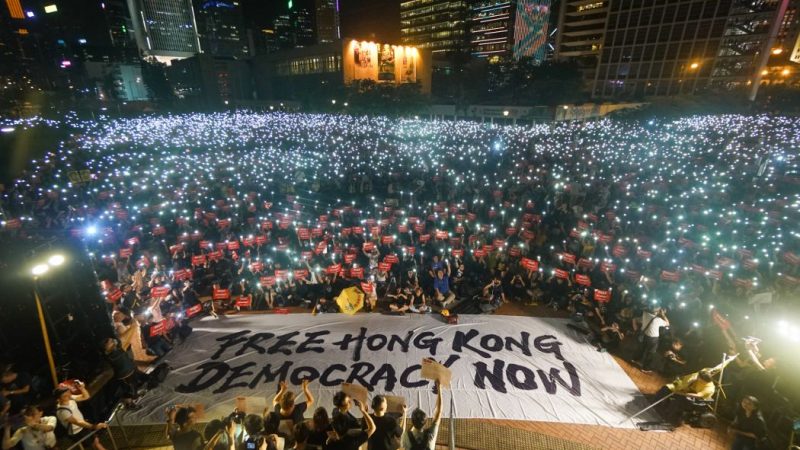Since early July 2019, Hong Kong residents have been reporting on social media that their mobile phones are being checked when they travel to mainland China. The border police officers in particular are looking for anti-extradition photos, videos and group chats. If the traveler is active in protest, s/he would be further interrogated and some are requested to write a letter of reassurance that they won't join the protests in the future.
A journalist from the South China Morning Post (SCMP) talked to 10 travelers who had their photos and videos checked at the Shenzhen and Hong Kong borders by mainland Chinese border police. Among the 10, half of them also had their private messages inspected. In at least one case, the police asked someone whom they had identified as an active protester for a DNA sample.
The inspection of mobile phones at the Shenzhen border started just after protests over the extradition bill — which would allow crime suspects residing in Hong Kong to be brought to trial in mainland China — escalated, and the Chinese government labeled the massive demonstrations as a “Color Revolution” against the communist regime. The biggest protests, which took place on June 16, were attended by two million people.
Of the 700 thousand people who move between the Hong Kong and China borders every day, half of them are Hong Kong residents — and this new border control measure has generated great panic among many of them, who either have businesses or relatives in mainland China.
Mobile phones checked
The majority of the SCMP reporter's interviewees wanted to talk about their experience at the border anonymously, as they could not avoid future travels to mainland China. The exception is 38-year-old technology consultant Ben Crox, who was willing to talk publicly about his experience. On July 24, soon after he passed the checkpoint, he posted on Facebook:
於西九膠鐵﹐過關被要求搜查﹐要打開手機檢查照片和影片﹐一一解釋來源﹐並要求開示在甚麼通訊軟件的甚麼群組收到﹐書本因為關員看不懂而沒收。車程擔誤不賠償。大概五至十個捉一個初檢…
At West Kwoloon Rapid Railway mainland China port area, I was stopped and asked to unlock my mobile phone. They checked on the photos and videos and I had to explain the sources. They also asked me to show them on which software application and chat groups I had obtained those photos. They did not confiscate my books as they did not understand the content. I could not catch my train and had not received any compensation. On average, about 10-20% of the passengers was stopped for the check up.
One of my Facebook connections, who is an IT professional, had a similar experience. He posted in a private update to his friends that he was checked by Chinese border police officers on July 26 at the Futian port area. While there, he observed that most of the travelers who were stopped by border control were young people. Apart from checking his photos and videos, the police asked him to open WeChat so that they could inspect discussions in various group chats.
Confirmed protesters interrogated
So what would happen if the border police actually found protest photos and videos on people's phones? On his Facebook page Blogger Chan Kam Shui shared a detailed account of one such case, in which the Hong Konger was brought to a detention room after a border police officer from Lo Wu found protest photos on his phone. He was asked which protests he had attended, who persuaded him to join the protests and why he had decided to protest. Border police then brought him to the Lo Wu police station, where they recorded his name, Hong Kong telephone number and address, and the names of his family members. The whole process took four hours.
In a separate case reported by the Stand News, a member of a product brand business was detained by the Shenzhen police for eight hours after anti-extradition protest photos were found on his mobile. He was photographed and made to provide a DNA sample. The Shenzhen police released him after he wrote a letter of assurance that he would not join any protests in the future.
Clever countermeasures
As more and more individual accounts of border checkpoint experiences circulated online, netizens took to social media to share tactics about how to deal with the situation. These included shifting to a clean mobile phone when traveling to mainland China, setting up a guest login password on mobile, deleting protest-related communication apps such as Telegram and LIHKG or storing their data in a secured cloud server, and power washing their mobiles before crossing the border.
In the past few days, there have been online discussions about Hong Kong protesters who have allegedly gone missing in mainland China. Lawmaker Lam Cheuk Ting has confirmed on Facebook that he was following up two of such cases on August 17. The news has generated so much panic among demonstrators and supporters of the protests that they are using these new tactics to help manage their fears.
To read more about the anti-extradition protests in Hong Kong, visit Global Voices’ special coverage page.




